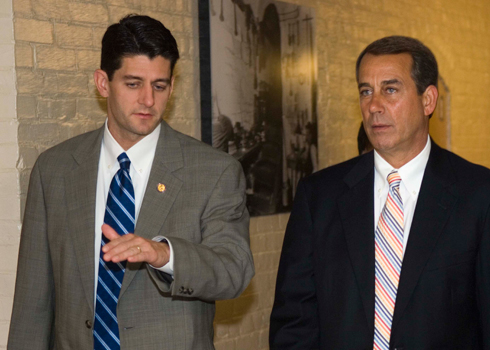One of the most fascinating political conundrums facing the GOP — whether or how to avoid conservative over-reach — might play out sooner than expected, when newly elected GOP members come to town. Despite their proclamations that they’ll take a humble approach to governing in the next two years — that they see the election as a referendum on Democrats, not a vote of confidence in themselves — leading Republicans are already making plans to turn the classic third rails of politics into major political issues. And they’re entering their new majority with as much bravado as they had under President Bush, when their last attempt to slash entitlements went down in flames.
“The third rail is not the third rail anymore,” Rep. Paul Ryan (R-WI), the incoming House Budget chairman, told reporters at a Christian Science Monitor breakfast roundtable with reporters yesterday. “The political weaponization of entitlement reform is no longer as potent as it used to be, and the best evidence is this last election.”
Ryan and several other influential Republicans have found new confidence in the idea that the public would support entitlement cuts. Several candidates, Ryan said, won elections in tough districts on policy platforms modeled after his controversial — and conservative — Roadmap for America’s Future would would privatize social security and turn Medicare into a voucher system.
“Look at the election,” Ryan implored. “Name me a new Republican who ran that didn’t have entitlement maps run against him, pretty much based on my Roadmap. But you know what? They all won.”
This view is a symptom one of the swiftest and most dramatic turns of political fortunes in recent memory.
Five years ago, Democrats embarrassed the Republican party after President George W. Bush asked the GOP to privatize Social Security. They attacks worked, and the privatization effort fizzled.
Four years ago — running on a campaign that included attacks on the GOP’s privatization plan — the Democrats retook control of Congress.
Two years ago, when Democrats padded their majorities in Congress, Republicans claimed to have found their humility. “The future is Cao,” wrote House Minority Leader John Boehner, referring to the moderate Republican Ahn “Joseph” Cao (LA) who, by fluke, won a liberal congressional district in New Orleans.
Last month, Cao was defeated by a Democrat. But scores of much more conservative Republicans were elected in his stead. And though the 2010 electorate skewed Republican, and though public polling still shows the public deeply opposed to conservative entitlement reform, the results were momentous enough to convince high-profile Republicans that their old ways were the right ways.
When I asked incoming Speaker John Boehner at his press conference yesterday whether he shared Ryan’s view of the new political landscape, Boehner suggested that the tide really had turned.
“I do believe that the American people expect us to have an adult conversation with each other about the serious challenges that face our country,” he said. “When you look at the promises that us Baby Boomers have made to ourselves, it’s clear that our kids and grandkids can’t afford those promises. We have to have this conversation. We ought to do it respectfully, we ought to do it honestly. But it’s time to have the conversation, and I think the American people are expecting us to come forward with a conversation.”
Sen. Jim DeMint (R-SC) — who’s toppled Republicans he views as insufficiently conservative, and successfully pushed his party to the right on a number of issues — goes even further than both Ryan and Boehner.
“[Paul Ryan] and I have been introducing Social Security reform proposals and Medicare reform proposals for years and he gets re-elected by good margins in a very difficult district,” DeMint said. “You tell people the truth, and don’t change benefits to people who are already retired, they’ll listen to you. We definitely need to do that. Younger workers would take a better option in a hurry — if they could get out and keep the money, you bet they’d jump on it.”










